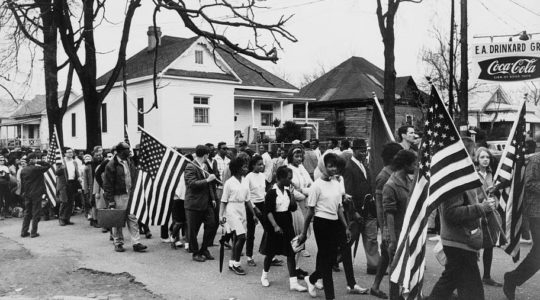The condition of Jewish life around the world is characterized by “malaise, uneasiness and anxiety,” Abraham Foxman, associate national director of the Anti-Defamation League of B’nai B’rith, told several hundred delegates at a plenary session at the 51st General Assembly of the Council of Jewish Federations.
There is a growing concern that the condition of Jewish life, “is altering, and not for the better,” he said. “For the first time in a long time the Jews anguish over Israel and the Jewish people.” This concern has intensified in recent years with outbreaks of anti-Semitic violence on the part of extremist groups, in this country and abroad and by terrorist attacks, Foxman observed.
The feeling of anxiety and uneasiness has also increased with the shift in the attitude of the general population toward the Jewish people and Israel, he said. Foxman said the shift has taken the form of viewing Israel as a nation which is no longer vulnerable. He said this changed attitude can be traced to Israel’s swift victory in the Six-Day War “which helped to erase the feeling of guilt” over the annihilation of six million Jews in the Holocaust. “Israel appeared so much closer to safety and security” after the 1967 war, he said.
A CHANGE IN THE HISTORICAL COURSE
In addition, Israel and the Jewish people also felt closer to safety and security after that war and as a number of historical developments unfolded in the 1960’s Vatican II opened a dialogue with Jews, Soviet Jews were making their way to freedom, and the civil rights movement in the United States “produced an upsurge of activism and hope that religious and racial bigotry were beginning to wither away.”
But then, Foxman told the forum on “Global Perspective of the Jewish Condition, “a development detrimental to the Jewish people and the State of Israel took place. The United Nations General Assembly adopted the infamous resolution equating Zionism with racism in 1975 and it has been repeated regularly since then at international conferences and forums where it serves as a rallying point for various interest groups and blocs seeking to defame Zionism and the Jewish people and to set the stage for undermining and eventually destroying Israel, Foxman said.
He emphasized that Jews who feel that anti-Semitism is on the rise are not being paranoid. “Jews do not live with the belief that the world wants them dead, but they live with the memory that the world did nothing to help them stay alive,” he declared.
CALL TO HELP EUROPEAN JEWRY
David Lewis of Great Britain, representative of the European Council for Jewish Community Services, which he said collectively speaks for some 1.5 million Jews in Western Europe, called on worldwide Jewry to “mobilize its forces to help European Jewry” who stand once again “on the new front line of anti-Semitism.”
He recounted the upsurge of anti-Jewish and anti-Israel incidents, Including bombings and mass demonstrations, in Austria, Belgium, Denmark, Greece, Italy, France and West Germany, He noted, for example, that in Denmark, a traditionally tolerant society. 10,000 people gathered recently to protest what they perceived to be Israel’s policy.
He pointed out that Israel’s policy toward the Palestinians, and specifically the war it launched in Lebanon, along with the media distortion of Israel’s policy has awakened dormant anti-Semitism in European countries. This policy has also created a feeling of disquiet among Jews because there is a “conflict between what Israel does and what we believe in terms of justice for all,” Lewis said.
In Great Britain, so far, there have been no bombings or explosions directed against Jewish or Israeli institutions and installations, Lewis said. But there has been a considerable number of anti-Semitic articles in the newspapers, vandalism of Jewish installations, and there are anti-Jewish sentiments on university campuses.
Jews in Britain, Lewis noted, are now the smallest ethnic minority, far outnumbered by Blacks and Asians. Whatever revival of dormant anti-Semitism there is in the country, is primarily due to the rightwing lunatic fringe and the growth in the mentality of scapegoating in a period of a general economic recession, he said.
SITUATION OF JEWS IN FRANCE
France’s Chief Rabbi Rene Sirat whose address in French was translated said that there has been diminishing support for the Jews of France in the general population since the bombing of the Rue Copemic synagogue in 1980. In the aftermath, some 300,000 people took to the streets of Paris to protest the attack, he said. This was duplicated on a smaller scale to other French cities. which have Jewish communities. It was, he stressed, a national response. The bombing also acted to solidarize Jews, Sirat pointed out. He said that in response to his personal appeal following the synagogue bombing, more Jews than ever attended Yom Kippur synagogue services that year.
But the decline in the support of Israel and of Jews in France since then has been due in part to actions by Israel which has been “disconcerting not only to Jews but to many French people,” Sirat said. Diminishing support has also been due to the pro-Palestinian slant and anti-Israeli focus of the news media.
Sirat was highly critical of Pope John Paul II for holding a private meeting with PLO chief Yasir Arafat. He said he was told by a Vatican official in Paris that the Pope would not receive Arafat privately but only as part of a general audience. But even as the official was reassuring Sirat, the rabbi said it was learned that the Pope had agreed 15 days earlier to meet privately with the PLO chief. Sirat said it was imperative to counter pro-Arab and anti-Israeli propaganda.
THE SCENE IN SOUTH AFRICA
Aleck Goldberg, executive director of South Africa’s Board of Jewish Deputies, said that anti-Semitism in his country is not a great problem. The government does not tolerate it and Jews enjoy all rights, he noted. Also, there is no fallout from international terrorism in South Africa. The violence in the country is committed by the underground extremist African National Council against while-owned property like the railroad lines and banks, not against Jews. The anger is directed against white domination, not against the Jewish community, Goldberg explained.
But Jews are part of those targeted for violence because they are perceived as an influential element in the white community and because they do not — as whites, rather than as Jews — use their influence to end discrimination against Blacks in the economy as a whole and in the economic sectors, such as mining, where Jews are dominant.
Black radicals are opposed to Israel primarily because they see Israel as allying itself with the racist government of South Africa and therefore see both governments as cooperating in suppressing and dominating Blacks and non-whites — in the case of Israel, the Palestinians. Radical Blacks, Goldberg said, have been influenced by Arab propaganda and are sympathetic toward the Third World. They are also influenced by the large Moslem community in the country which is sympathetic to the Arab cause.
Nevertheless, Jews in South Africa do face a moral dilemma, Goldberg observed. The dilemma he noted, is that the ethical imperative instructs that discrimination is antithetical to Judaism; the historical imperative says that Jews who for centuries were victims of discrimination should not countenance discrimination. But to combat discrimination would require that Jews as a group enter the political arena. This, however, would be a dangerous step, Goldberg said.
There are differing views in the Jewish community on the issue of apartheid, he said, and a unified stand on this is not possible. Nevertheless, the Board of Deputies has spoken out in resolutions against discrimination. Recently, Goldberg reported, the Board protested against the practice of detaining individuals without trial. The detentions affect primarily Black opponents of the government. The general outlook in South Africa, he said, is that eventually there will be a Black-white confrontation but Jews will not figure as Jews in that clash.
The Archive of the Jewish Telegraphic Agency includes articles published from 1923 to 2008. Archive stories reflect the journalistic standards and practices of the time they were published.



